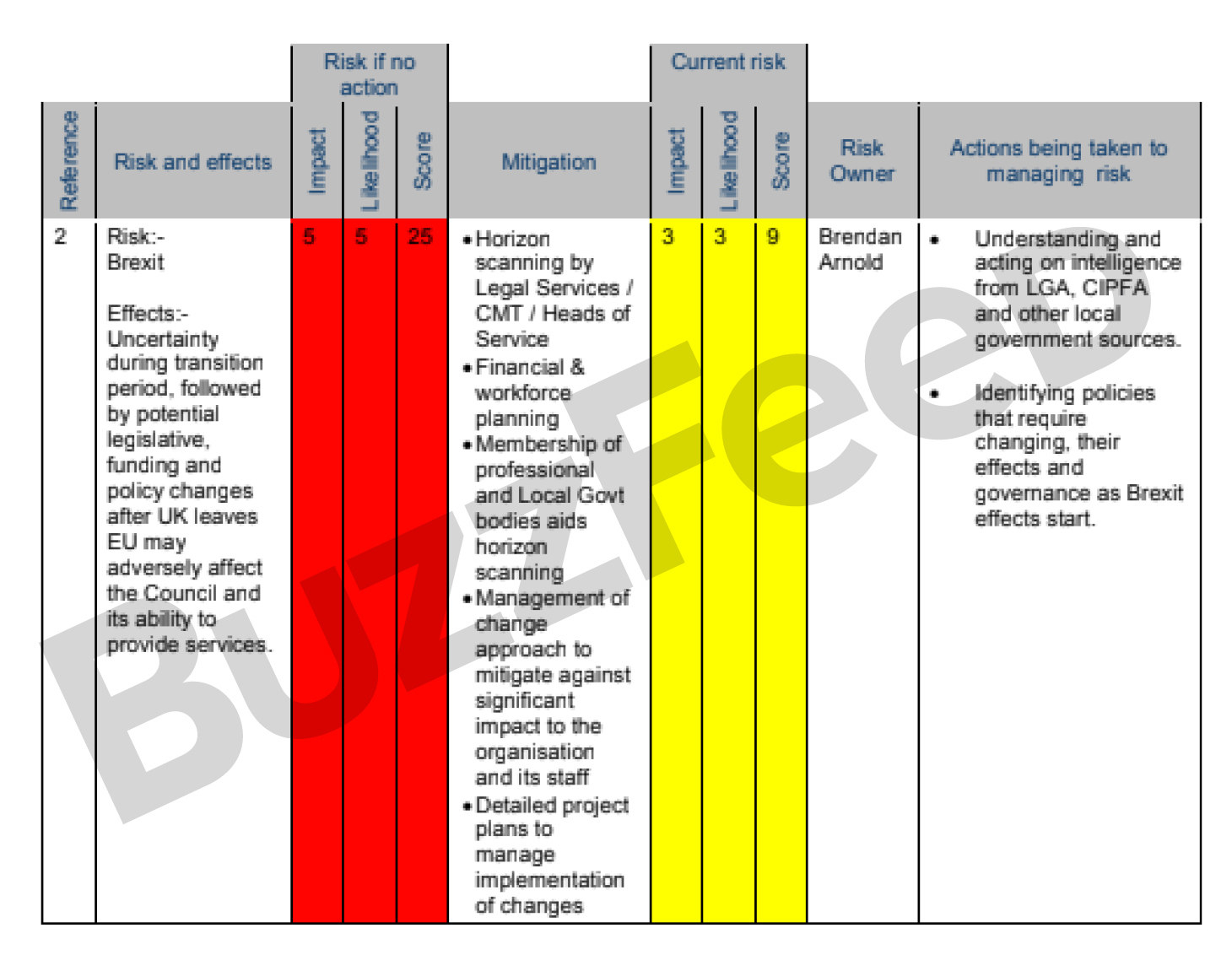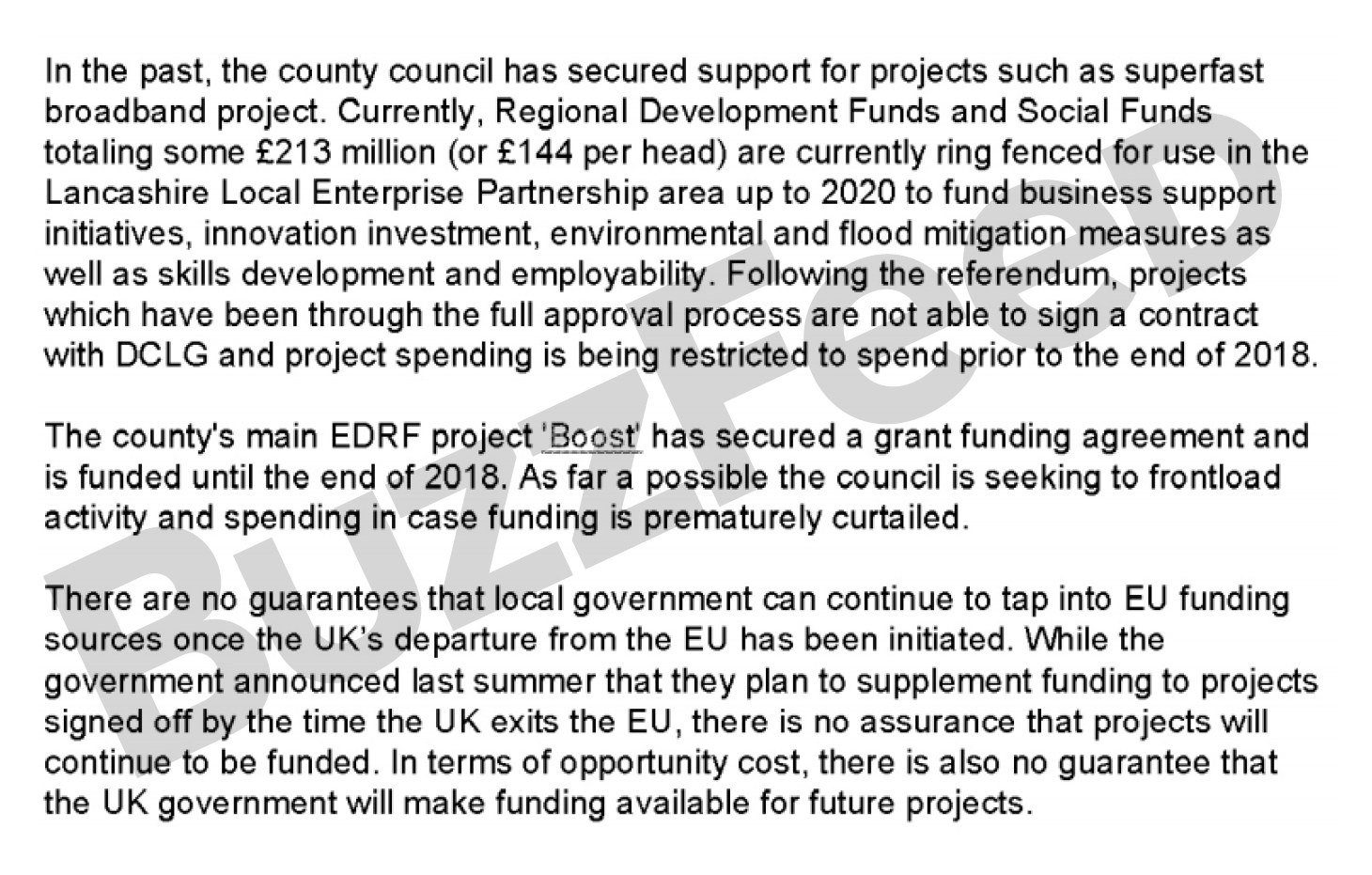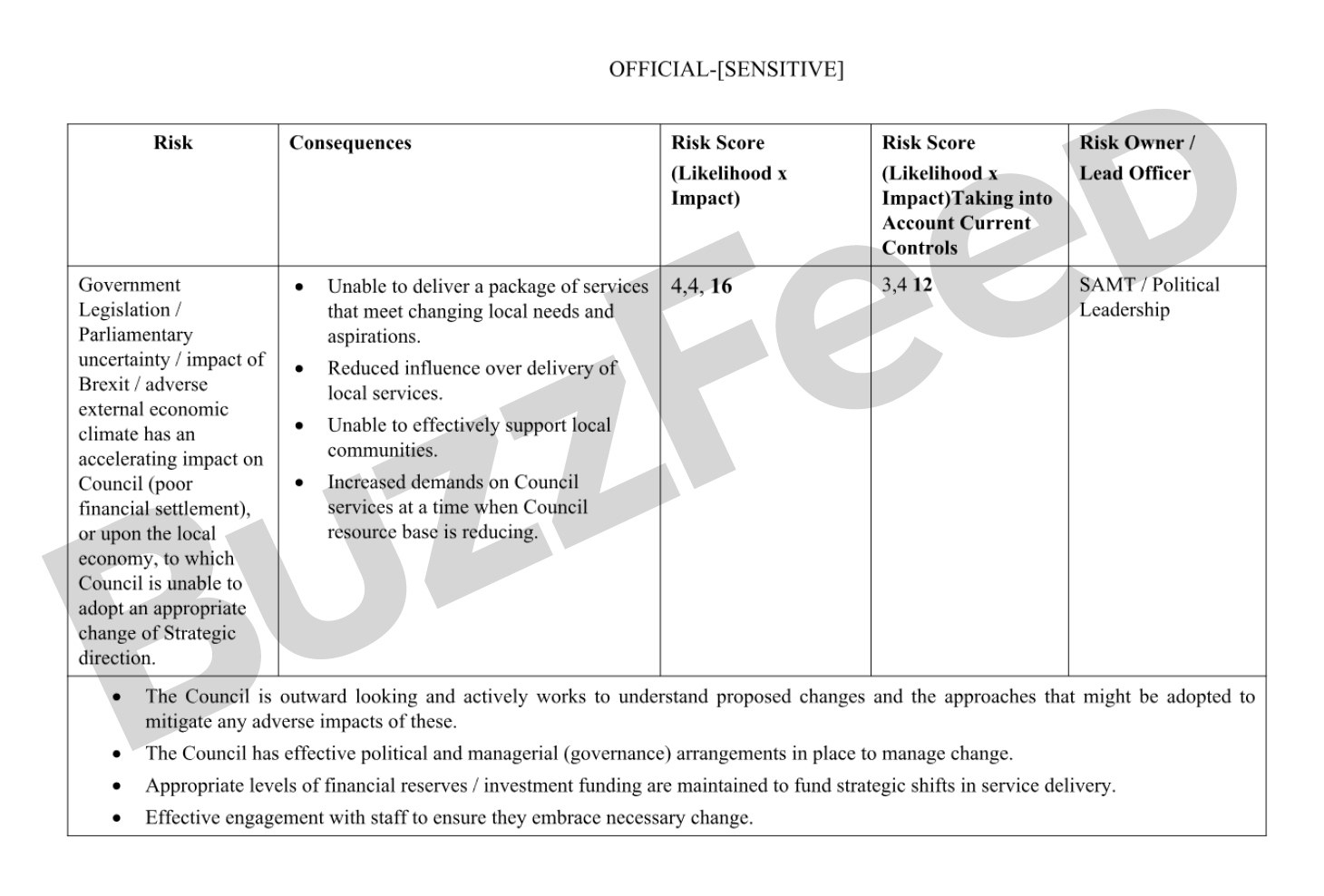
Local authorities across the country have warned that Brexit could lead to billions of pounds of funding shortfalls, infrastructure projects unable to be signed off, threats to public services and projected rises in homelessness, poverty and unemployment, according to a new series of impact assessments obtained by BuzzFeed News.
Analyses produced by 21 councils, released for the first time under the Freedom of Information Act, reveal that they have expressed detailed concerns at the damage leaving the European Union will have on their communities and businesses. Many of the areas covered by the disclosures voted heavily for Leave.
The responses also reveal anger among councils that their warnings are being ignored by the government.
In Leave-voting Cornwall, which has been at the heart of the Brexit debate over claims it is one of the most vulnerable rural areas in the UK and could run out of food within days in the event of no deal, the council’s service director Jessie Hamshar was scathing about central government’s response and the sidelining of the Department of Communities and Local Government from the planning process.
“Local government was promised a seat at the table,” Hamshar is quoted as saying in evidence to a select committee hearing referenced in one of the disclosures. “It is not clear even where the table is never mind what the seat is. If you look at the five committees that have been set up, even at a ministerial level the DCLG Secretary of State is represented at only one of them”.
The document noted that this "seems to be the view of the sector as a whole".

In August, Sky News published a raft of local authority risk assessments in which councils in Dover, Kent, Bristol and Pembrokeshire outlined worries about the uncertainty of the Brexit process and the impact on public services.
The documents, researched by the Best For Britain campaign group and newly disclosed to BuzzFeed News, show the full range of services that councils across the country say will be hit.
Fenland district council in Cambridgeshire — which covers an area that experienced some of the highest levels of immigration from Eastern Europe and where more than 70% of people voted to leave the EU — produced a corporate risk register in June this year which gave the risk of failing to take action to prepare for Brexit a score of 25/25. That rating is reserved for items with the potential for “catastrophic impact” and equal to the threat posed by a natural disaster.
The criteria to be met to achieve such a rating includes loss of service delivery for more than seven days, loss of life and financial loss of over £4 million. Even when mitigated with appropriate planning, the council says the current risk remains at “additional costs”, “time delays” and “noticeable disruption”.

BuzzFeed News can disclose that Lancashire county council commissioned a report which highlighted widespread concerns about funding black holes.
“While the government announced last summer that they plan to supplement funding to projects signed off by the time the UK exits the EU, there is no assurance that projects will continue to be funded,” the report said.
It explained: “Following the referendum, projects which have been through the full approval process are not able to sign a contract with DCLG and project spending is being restricted to spend prior to the end of 2018."
Lancashire’s business growth hub ‘Boost’, which is funded by the European Regional Development Fund, is only funded until 2018. “As far as possible the council is seeking to frontload activity and spending in case funding is prematurely curtailed,” the report said.
It also warned the £2 billion of annual exports from the county to the EU could be hit by increased costs, foreign direct investment could be “deterred”, and that “workforce issues” caused by restrictions to migration could impact social care. “There is already some evidence” that EU citizens are leaving, the report claimed.

A corporate risk register produced by Harrow council listed potential consequences of Brexit including “increases in levels of poverty, homelessness and health inequalities in the Borough, increased front-door pressures and demand… potential cut-backs in services, full regeneration plan potentially not viable… negative economic downturn in local economy”.
A document produced by Bolsover district council marked “sensitive” offers a devastating assessment of the impact of Brexit. It says that unless funding and contingency plans are put in place it will be “unable to deliver a package of services that meet changing local needs and aspirations”.
It warns the council could have “reduced influence over delivery of local services” and be “unable to effectively support local communities”. Bolsover was one of top ten Leave-voting councils in the UK, with 70.8% of voters backing Brexit.

Norfolk county council has requested the government sets up a Brexit Impact Fund to replace billions of pounds of investment and mitigate increased strain on public services. The council calculated that £7.34 billion of EU-based funding for Leave-voting Norfolk and Suffolk was at risk and would need to be replaced by the UK government.
The council said additional funds would be needed to pay for social care and benefits for British expats returning to the UK, and predicted Brexit will see the number of homeless and destitute migrants increase, placing a greater burden on the NHS and police.
An analysis produced by Cheshire East council found that of the top 100 companies in the area, 14 firms contributing almost £1 billion to the local economy were assessed as being at “high risk” from leaving the EU. Another 43 companies were judged to be at “medium risk”. The analysis reported that investment proposals have been put on hold until the outcome of Brexit becomes clearer. Cheshire East also voted to Leave.
Several councils raised the alarm that Brexit could negatively impact housebuilding. Cambridge city council warned “uncertainty in the financial markets could see a slowdown in housebuilding”. Brent council predicted that “if the UK leaves the Single Market and cannot secure short- to medium-term continued access to migrant labour, this will have major implications for the costs and supply of affordable homes”.
The picture in Brent is particularly stark, the documents show. The council reported “spikes in hate crime have occurred in relation to Brexit events, such as the referendum”. Brent’s Early Years team, responsible for childcare services, has said it is particularly worried as it relies on staff from EU countries.
A 19% increase in hate crime after the referendum was also reported by Hackney council, who described this as a “key headline” in their Brexit impact assessment. It also included a finding that a no deal Brexit would result in 2,100 fewer jobs in Hackney by 2030, and that “all scenarios” of Brexit ranging from hard to soft will have “negative implications for economic growth [and] employment”. Business submissions received by Hackney council included evidence from one advertising business that “it’s not an exaggeration to say Brexit has traumatised our office and the sector we cover”.
Hammersmith and Fulham council’s analysis of the potential impact of a no deal Brexit said it would result in inflation, an economic slowdown and worse public finances, causing “deeper cuts” impacting a range of public services and threatening the viability of regeneration initiatives. They envisage that each extra 1% of inflation will lead to a cost pressure of £0.8 million per year for wages and £2 million per year for supplies and services
In the borough, the analysis said, “the impact of Brexit is already being seen on the health and social care sector, with significant reductions in recruitment and retention of EU nationals working in the sector since the referendum”. It concluded “the biggest impact on public services of a no-deal Brexit is likely to be seen in health and social care provision”.
In North Ayrshire, the council’s Brexit risk assessment said that up to 25% of the money it spends on economic development in rural and deprived areas currently comes from the EU, and that “to date there has been no indication from the UK government on any future commitment to replace EU funding”.
Liberal Democrat MP Layla Moran, champion of the Best for Britain campaign group, told BuzzFeed News: “These internal council documents are devastating. They show Brexit will cause tremendous damage to these councils and their ability to provide the quality public services towns and cities up and down the country so desperately need. It's the political equivalent of dismembering yourself”.
She added: "The only thing scarier than these documents is the fact that some councils haven't done them — effectively they're walking off a cliff blindfolded."
